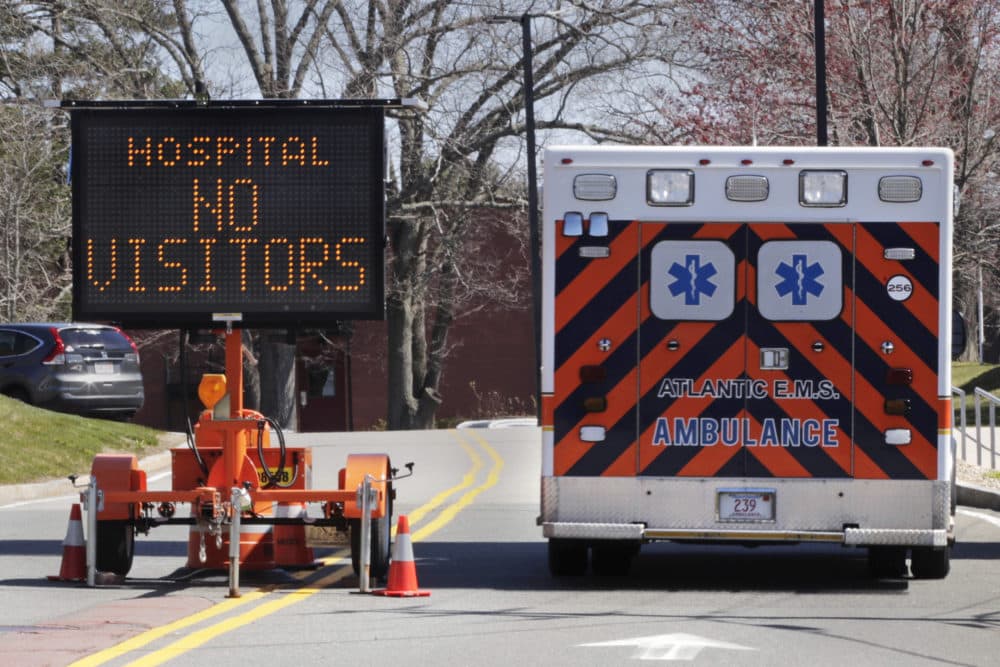Advertisement
Coronavirus Coverage
Fear Of COVID-19 Kept Heart Attack Patients From Seeking Help. Doctors Fear It Cost Lives
Resume
Shortly after state officials started asking people to stay at home to reduce the spread of the coronavirus, Dr. Jason Wasfy noticed something odd. Wasfy is a cardiologist at Massachusetts General Hospital, and normally his ICU is filled with people recovering from heart attacks.
But in the beginning of March, it was almost empty.
“[It] was this kind of startling change," he says. "I had not seen a single heart attack that week, and I had never seen [that] before, the whole week without one traditional heart attack."
Heart attacks and other medical emergencies had not mysteriously disappeared, however. Doctors in Massachusetts and around the world believe that many patients were fearful they would contract the coronavirus at a doctor’s office or hospital, so they waited to seek care. For some patients with cardiac disease, that led to more severe complications — and in some cases, doctors fear, even death.
"I had not seen a single heart attack that week, and I had never seen [that] before."
Dr. Jason Wasfy, Cardiologist, Mass. General Hospital
Wasfy found that his hospital wasn’t the only one to see its typical emergency patients dry up practically overnight. He dug into data from eight different Mass. General Brigham hospitals, looking to see if other doctors had also experienced a sudden and dramatic drop. He set aside events like car accidents and broken bones— since people weren’t traveling as much, he figured there would be fewer of those types of emergencies.
“We looked at things like more severe types of heart attack. We also looked at gastroenterology kind of emergencies. There’s no plausible mechanism for that actually changing,” Wasfy says. “The results kind of confirmed a lot of our worst fears.”
When Wasfy analyzed the data, he found that patients seeking care for those types of medical emergencies dropped by almost 50% in March and April, when compared to the same period last year. For some life-threatening heart attacks, hospitals in the network saw a 40% decline.
“It raises a real concern that patients were experiencing symptoms of these conditions and not coming to the hospital,” he says. “I was horrified. And you know, I’m a cardiologist. I know how serious these conditions are.”
Many of the conditions Wasfy looked at in his study can be fatal. Then, cardiologists around the world began posting on social media about complicated heart attack cases that they were seeing. In Italy, one study found that heart attack fatalities had risen during the pandemic. These emergencies were still happening, cardiologists realized. People were just having them at home.
“I was horrified. And you know, I’m a cardiologist. I know how serious these conditions are.”
Dr. Jason Wasfy, Cardiologist, Mass. General Hospital
“One instance was a lady who came in with symptoms that was actually going on for days,” says Dr. Ali Haider, a cardiologist in Springfield. “Her fear of COVID outweighed her fear of seeking help. So, she had chest pain for the whole day. She stayed home, felt crummy. Then three days later, she felt really bad and came in.”
When Haider examined her, he found the heart attack had caused a rupture in one of the walls of her heart.
“She had a VSD or ventricular septal defect. The heart attack led to a drop in oxygen that led to muscle death. Eventually, basically, a hole pops in the heart. That’s bad,” he says. “That particular patient didn’t survive."
These types of heart injuries are rare because it takes days for these holes to form, Haider says. Most people come to the hospital as soon as they have symptoms of a heart attack and receive treatment, so they never develop the condition. His hospital typically sees only one or two cases a year. But Haider says this patient was one of three in a month.
“Which is a lot, you know? At least two of them I know for a fact ... were because of a delay of seeking care because of fear of COVID,” he says. "If they came in when they had chest pain, they would probably be totally fine."
In the last month or so, Haider says several more of his patients passed away.
“Four of my patients over the course of two weeks died at home. These are patients I’ve known for a long time. [They had] cardiac disease, but were stable,” he says.
He can’t be certain, but he says it’s hard to think that their deaths weren’t somehow related to the COVID-19 pandemic. It remains unclear how widespread this might be, but Haider says many of his colleagues describe similar experiences.
"At least two [deaths] I know for a fact ... were because of a delay of seeking care because of fear of COVID ... If they came in when they had chest pain, they would probably be totally fine."
Dr. Ali Haider, Cardiologist
Patients with cardiovascular disease are not alone in deferring care over concerns about COVID-19, says Dr. Elissa Perkins, an emergency physician at Boston Medical Center. She describes seeing patients with diabetes who avoided picking up insulin prescriptions because they were nervous about going to the pharmacy, and people with broken bones who delayed treatment for days despite being unable to walk or care for themselves.
“They were some of the saddest cases I’d seen in a long time,” she says. “I started seeing patients that were just at a way more advanced part of their disease course than we are used to seeing them. I think every class of chronic disease is being impacted somehow.”
Now that Massachusetts is opening back up, and new COVID-19 cases are dropping, Perkins says more patients are coming back to the hospital. But her patient volume hasn’t hit typical pre-COVID-19 levels yet, she says. She understands why people have been reluctant to seek care. The message for months has been to stay home as much as possible and avoid overburdening the health care system.
“It’s not exactly an environment you saw as safe,” Haider says. “So, that didn’t help.”
"I think every class of chronic disease is being impacted somehow.”
Dr. Elissa Perkins, Emergency Physician, Boston Medical Center
Hospitals and doctors offices are making changes to protect patients from exposure to the coronavirus. Most are screening patients before they arrive for appointments, asking them to wait outside rather than crowd a waiting room, and designating separate areas for people who do and do not have the virus.
The new message is that hospitals are open, and they're safe, and that not getting the care you need is far more dangerous than venturing out to fill a prescription or see a provider.
Doctors now need to catch up to the collateral damage from deferred care over the COVID-19 pandemic, Perkins says. She explains that she’s being more proactive about following up with patients who have chronic conditions like heart disease.
“We weren’t prepared the way we ought to have been," she says. "Given the circumstances we were faced with, I think the health care systems did a remarkable job. But next time we need to do better, and we need to make up for what we didn’t do well that time."
This article was originally published on June 24, 2020.
This segment aired on June 24, 2020.
